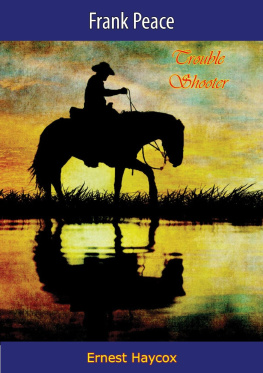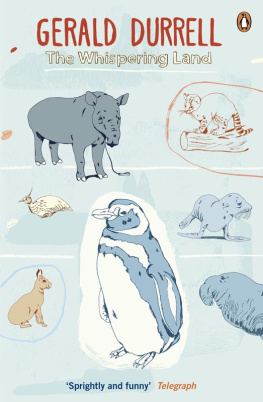This edition is published by BORODINO BOOKS www.pp-publishing.com
To join our mailing list for new titles or for issues with our books borodinobooks@gmail.com
Or on Facebook
Text originally published in 1930 under the same title.
Borodino Books 2017, all rights reserved. No part of this publication may be reproduced, stored in a retrieval system or transmitted by any means, electrical, mechanical or otherwise without the written permission of the copyright holder.
Publishers Note
Although in most cases we have retained the Authors original spelling and grammar to authentically reproduce the work of the Author and the original intent of such material, some additional notes and clarifications have been added for the modern readers benefit.
We have also made every effort to include all maps and illustrations of the original edition the limitations of formatting do not allow of including larger maps, we will upload as many of these maps as possible.
WHISPERING RANGE
by
ERNEST HAYCOX
ABOUT THE AUTHOR
Ernest Haycox during his lifetime was considered the dean among authors of Western fiction. When the Western Writers of America was first organized in 1953, what became the Golden Spur Award for outstanding achievement in writing Western fiction was first going to be called the Erny in homage to Haycox. He was born in Portland, Oregon and, while still an undergraduate at the University of Oregon in Eugene, sold his first short story to the OVERLAND MONTHLY. His name soon became established in all the leading pulp magazines of the day, including Street and Smiths WESTERN STORY MAGAZINE and Doubledays WEST MAGAZINE. His first novel, FREE GRASS, was published in book form in 1929. In 1931 he broke into the pages of COLLIERS and from that time on was regularly featured in this magazine, either with a short story or a serial that was later published as a novel. In the 1940s his serials began appearing in THE SATURDAY EVENING POST and it was there that modern classics such as BUGLES IN THE AFTERNOON (1944) and CANYON PASSAGE (1945) were first published. Both of these novels were also made into major motion pictures although, perhaps, the film most loved and remembered is STAGECOACH (United Artists, 1939) directed by John Ford and starring John Wayne, based on Haycoxs short story Stage to Lordsburg. No history of the Western story in the 20 th Century would be possible without reference to Haycoxs fiction and his tremendous influence on other writers of stature, such as Peter Dawson, Norman A. Fox, Wayne D. Overholser, and Luke Short, among many. During his last years, before his premature death from abdominal carcinoma, he set himself the task of writing historical fiction which he felt would provide a fitting legacy and the consummation of his lifes work. He almost always has an involving story to tell and one in which there is something not so readily definable that raises it above its time, an image possibly, a turn of phrase, or even a sensation, the smell of dust after rain or the solitude of an Arizona night. Haycox was an author whose Western fiction has made an abiding contribution to world literature.
CHAPTER ISUNDOWN
Eve Leverage came out of the hotel like a boyswiftly, carelessly, and her lips pursed in the attitude of whistling. Her gray eyes quested along the street with a level expectancy; her tip-tilted nose made a wrinkling gesture against the hot sun. Two gangling punchers who seemed to have collapsed to semi-consciousness on the porch steps gathered themselves together foot by foot and rose before her, muttering, Gmornin, Miss Eve, in unison. Eves thoughtful preoccupation vanished before a frank, glinting smile. Hello, Pete. Hello, Buck. Busy as usual, I see. Then she stopped so abruptly that one of the men threw out his hand, thinking she was about to trip on the steps. Eve never noticed the gesture. Her glance, going on down the street, had reached its mark. David Denver appeared through the crowd and strolled leisurely forward. A coral pink appeared on Eves cheeks; she looked again at Messrs. Buck Meems and Pete Wango, and she looked into her purse.
What became of that letter? she asked these two shiftless sons of the prairie. I had it in my hands just a moment ago.
The gentlemen flinched, as if accused of stealing it. Wango, having a chew in his mouth, remained stolidly dumb. But Meems was a more versatile man and made a stab at intelligent conversation. Was ituhimportant, maam?
You have no idea, said Eve mysteriously. Now, Ive got to find it. She turned to the door, cast a quick look around, and stopped half inside the opening to watch Denver; to her the street, dusty and sprawling and hot, had become suddenly eventful.
David DenverBlack Dave Denverapproached in comfortable idleness. He had his hat tipped back and his face turned toward Cal Steele who walked alongside and told some kind of a story with much gesturing of arm. Denver nodded, the somber gravity of his features lighting up. Rather wistfully the girl wished she knew the kind of a story Cal Steele related, for there were few people who could make Dave Denver smile. Steele, in fact, was almost the only man who had the power of lifting Denver out of those strange and darkly taciturn moods that so often descended upon him.
The two of them stopped. Al Niland came across to join in, and presently Steve Steers emerged from Grogans Western Star. So the four of them drew together as they inevitably did when in the same neighborhood. Dissimilar in so many respects and sharply varied in personalities, there yet was some common quality that cemented a deep friendship between them. The girl often had wondered about it, and at this moment she puzzled over the problem again. Al Niland was a lawyer who liked to take poor mens cases and fight with an ironical energy. Steve Steers was a roving puncher who, though welcome on any ranch, preferred to ride free and solitary through the hills. Cal Steele owned a small outfit near Dave Denvers D Slash ranch, and of the group this man was the most brilliant, the most volatile, and the most prodigal of his energy and talents. They were all young, and they were all fighters. But the girl, seeking deeper reasons, knew some deeper trait was shared by them. They were restless, nonconforming men; each a strong individualist and without illusions. Dave Denvers streak of clear-sighted grimness could be found likewise in the others.
The girl sighed a little as she saw Denvers smile fade and his bold features settle. The others were grinning amiably at some wild tale told by Steve Steers; but Denvers moment of forgetfulness was past, and he reverted again to the stormy, unsettled side of his nature. The first hot sun of the young year reached nooning and flashed down on the shackling, paint blistered buildings of the town, on the pine false fronts, on the whitewashed dobe walls, on the stone turret of the courthouse, on the drawn curtains of the second-story windows. A dinner bell rang. Buck Meems was drawling at his partner.
S funny thing, Pete. Evbody considers Denver a big man. You do, I do, evbody does. But look at him standin beside Al Niland, not an inch taller ner a pound heavier. Al aint moren five feet eleven, and he dont weigh a hunnerd-seventy on the hocks. See what I mean? Denver aint rully a big man when yuh git him among others. Its only when hes off by hisself that he looks like a young house movin down the street. Funny, aint it, Pete?






